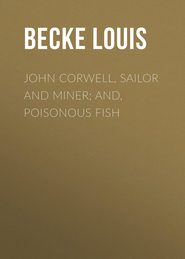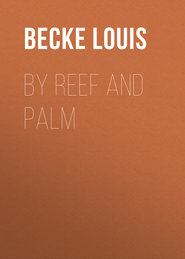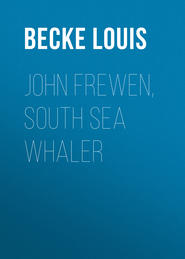По всем вопросам обращайтесь на: info@litportal.ru
(©) 2003-2024.
✖
"Chinkie's Flat"
Настройки чтения
Размер шрифта
Высота строк
Поля
Grainger, who was not just then well enough to go with them, but remained in his seat with his revolver on his knee, could not help smiling at the sudden halt and terrified looks of the Chinese, when Scott and the others drew up in front of them with their weapons at the present. Half of them at once dropped their baskets and darted off into the bush, the rest crowding together like a flock of terrified sheep. The leader, however, came steadily on. Scott stepped out and met him.
“Good-morning. What do you and all your crowd want here?”
“Nothing,” replied the Chinaman quietly, in excellent English, “nothing but to get down to the creek and camp for a few days. But why do you all come out with guns? We cannot do you any harm.”
“Just so. But we can do you a lot if you try on any games, Mr. Jimmy Ah San.”
“Ah, you know me then,” said the man, looking keenly at Scott.
“Yes, I do, an’ you’re all right enough. But me an’ my mates is going to keep this field for white men—it ain’t goin’ to be no Chinaman’s digging’. So what’s yer move?”
“Only what I said. Look at my men! We do not want to stop here; we wish to push along to the coast. Some of them are dying from exhaustion, and my pack-horses can hardly go another quarter of a mile.”
Soott scratched his chin meditatively, and then consulted with his mates. He, although so rough in his speech, was not a bad-natured man, and he could see that the Chinese were thoroughly done up, and worn down to skin and bone. Then presently Grainger walked over and joined them, and heard what Ah San had to say.
“I’m sorry that you are in such a bad fix,” he said, “but you know as well as I do that if any of your men put a pick into ground here, there will be serious trouble, and if they lose their lives you will be responsible—and may perhaps lose your own.”
“I promise you that nothing like that will happen,” replied the Chinaman. “My men are all diggers, it is true, but we will not attempt to stay on any field where we are not wanted. My name is James Ah San. I am a British subject, and have lived in Australia for twenty-five years. That man” (pointing to Scott) “knows me, and can tell you that ‘Jimmy Ah San’ never broke a promise to any man.”
“That is right enough,” said Scott promptly; “every one in Gympie knew you when you was storekeepin’ there, and said you was a good sort.”
“We have come over three hundred miles from the Cloncurry,” went on the Chinese leader, quickly seeing that Scott’s remark had much impressed the other miners; “the diggers there gave us forty-eight hours to clear out. The blacks killed fifteen of us and speared ten of my horses, and six more men died on the way. We can do no harm here. We only want to spell a week, or two weeks.”
“Poor devils!” muttered Grainger; then he said to Ah San: “Very well. Now, you see the track going through that clump of sandalwood? Well, follow it and you’ll come to a little ironstone ridge, where you’ll find a good camping-ground just over a big pool in the creek. There’s a bit of sweet grass, too, for your horses, so they can get a good feed to-night. In the morning this black boy will, if you like, show you a place in the ranges, about four miles from here, where you can let them run for a week. There’s some fine grass and plenty of water, and they ought to pick up very quickly. But you will have to keep some one to see that they don’t get round the other side of the range—through one of the gaps; if they do, you’ll lose them to a dead certainty, for there are two or three mobs of brumbies[2 - Wild horses.] running there. Do you want any tucker?”[3 - Provisions.]
“No, thank you,” replied Ah San, with an unmistakable inflexion of gratitude in his voice; “we have plenty of rice and tea, but I should like to buy a bullock to-morrow, if I can—I saw some cattle about two miles from here. Is there a cattle station near here?”
“No. The cattle you saw belong to one of us—this man here,” pointing to Jansen, “will sell you a beast to-morrow, I daresay.”
Then the armed protectors of the integrity from foreign invasion of the rights of Chinkie’s Flat nodded “Good evening” to Ah San, and walked back across the road to the “Digger’s Best,” and the Chinamen, with silent, childlike patience, resumed their loads and trotted along after their leader. They disappeared over the hill, and ere darkness descended the glare of their camp fires was casting steady gleams of light upon the dark waters of the still pool beneath the ridge.
CHAPTER IV ~ GRAINGER AND JIMMY AH SAN TALK TOGETHER
It was eight o’clock in the morning, and Jimmy Ah San, a fat, pleasant-faced Chinaman, dressed in European costume, came outside his tent, and filling his pipe, sat down on the ground, and with his hands clasped on his knees, saw six of the white men emerge from two or three humpies, and walk down to the new shaft to begin work.
He was well acquainted with the previous history of the spot upon which he was now gazing, and something like a scowl darkened his good-humoured face as he looked upon the ragged, half-famished surrivors of his company, and thought of the past horrors and hardships of the fearful journey from the Cloncurty. Fifteen of their number had been murdered by blacks in less than a fortnight, and the bones of half a dozen more, who had succumbed to exhaustion or thirst lay bleaching on a strip of desert country between the Cloncurry and the Burdekin River.
But Ah San was a man of courage—and resource as well—and his five-and-twenty years’ experience of bush and mining life in the Far North of Australia enabled him to pilot the remainder of his men by forced marches to the Cape River, where they had spelled for a month so as to gain strength for the long stage between that river and Conolly’s Creek, on one of the deserted fields of which he hoped to settle and retrieve his broken fortunes.
As he sat and watched and thought, eight or ten members of his company came and crouched near him, gazing with hungry eyes at the heaps of mullock and the mounds of tailings surrounding the “Ever Victorious” battery, watching the Europeans at work, and wondering when they, too, would give it up and follow their departed comrades. For the Chinamen knew that those dry and dusty heaps of mullock and grey and yellow sand, on which the death adder and the black-necked tiger snake now coiled themselves to sleep in the noon-day sun, still contained gold enough to reward patient industry—industry of which the foreign-devils were not capable when the result would be but five pennyweights a day, washed out in the hot waters of the creek under a sky of brass, “with flour at two-pounds-ten per 50 lb. bag,” as Dick Scott said.
Presently, turning to a sun-baked, lanky Chinaman near him—his lieutenant—he bade him tell the men to prepare to go down to the Creek, and drag some of the pools with a small seine.
“There are many fish in all these creeks which run into the great river” (the Burdekin), “but I will first go to the foreigners and ask their permission. The tall, sick man is well disposed towards us, and we must be patient and submit to the tyranny of the others for a little while. But all may yet be well with us if I can but get speech of him alone. Meanwhile, keep the company under close watch; let no man wander from the camp till I return.”
Then entering his tent, he took from a canvas pack-bag a small bottle, put it in his coat pocket, and, descending the ridge, walked towards the “Digger’s Best.”
As he drew near, Grainger, followed by the landlord, came out of the house and sat down on rudely made reclining chairs, composed of two pieces of sapling, with cross-pieces, from which was slung a flour sack.
“Good morning, gentlemen,” said the Chinaman politely.
“Good morning,” they replied civilly, and then Grainger, who was wearing a heavy overcoat, for the chill of an attack of ague was near, asked him to sit down and inquired how his men were.
“They are getting on very well, thank you, sir,” replied Ah San, “but several of them are very weak, and will not be fit to travel for a fortnight unless we carry them. But the rest will do them much good, especially if they get a change of food. I have come now to ask you if you and your mates will let us drag some of the pools in the creek for fish. We have a small net.”
“Certainly,” replied Jansen; “some fish will do them good, and the pools are alive with them now that the creek is so low. And anyway, we don’t want to stop you from getting food—do we, Mr. Grainger?”
“Certainly not; we have no earthly right to prevent you from taking fish in the creek, and even if we had we should not use it. We are not brutes.”
“Thank you very much,” said Ah San—and then, addressing himself to the landlord, he asked him if he had a bullock to sell.
Jansen was an alert business man at once. He had a small herd of cattle running wild about the creek! and was only too glad to sell a beast.
“You can have any bullock you like—the biggest in the lot—for a fiver—but, cash down.”
The Chinaman pulled out his purse, handed him a five-pound note, and asked when he could have the beast.
“In about an hour, if you want to kill right off; but you ought not to kill till sundown in such weather as this. But, anyway, I’ll saddle up and get a man to help me run the mob into the stockyard. Then you can pick one out for yourself–there’s half a dozen bullocks, and some fine young fat cows, so you can have your choice.”
In a few minutes the landlord had caught and saddled two horses, and riding one, and leading the other, he went off to the new shaft, where the spare horse was mounted by one of the men working there.
Then Ah San turned to the sick man, and said interrogatively—
“You have fever?”
“Yes, I caught it up Normanton way in the Gulf Country six months ago, and thought I was getting clear of it, but a month back it came on again, and I have been pretty bad ever since.”
“I can see that, and the Gulf kind of fever is bad—very bad. I know all about it, for I lived in the Gulf Country for ten years, and have had it myself. Now, here is some medicine which will do you good—it will cure you in ten days if you take a dose every time you feel the ‘shakes’ coming on. But you must not eat more than you can help.”
“Thank you,” said Grainger eagerly, as he took the bottle; “it is very kind of you. But you may want it yourself?”
“I have three or four more bottles left. I had a dozen from the doctor at Georgetown on the Etheridge River. He is a man who knows all about fever, and I can assure you that you will be a well man in ten days. Show me your hand, please.”
The European extended his hand languidly to the Chinaman, who looked at the finger-nails for a moment or two: “You will have the ‘shakes’ in a few hours.”
“Yes. They generally come on as soon as the sun gets pretty high—about nine or ten o’clock.”
“Then you must take a dose now. Can I go inside and get a glass and some water?”
“Yes, certainly. It is very good of you to take so much trouble.”
Returning with a glass and some water, the Chinaman poured out a dose of the mixture, and with a smile of satisfaction watched the sick man drink it.
Then Grainger and his visitor began to talk, at first on general matters such as the condition of the country between the Cloncurry and the Burdekin, and then about Chinkie’s Flat, its past glories and its present condition. The frank, candid manner of Ah San evoked a similar freedom of speech from the Englishman, who recognised that he was talking to an intelligent and astute man who knew more about the Far North of Queensland and its gold-fields than he did himself.
Then Ah San saw the opportunity for which he had been waiting, and drawing his seat nearer to Grainger’s he spoke earnestly to him, told him exactly of the situation of himself and his company, and ended up by making him a certain proposition regarding the working of the abandoned claims, and the restarting of the rusting and weather-worn “Ever Victorious” battery.
Grainger listened intently, nodding his head now and then as Ah San emphasised some particular point. At the end of an hour’s conversation they heard the cracking of the landlord’s stock whip and the bellowing of cattle as they crossed the creek, and the Chinaman rose and held out his hand.











